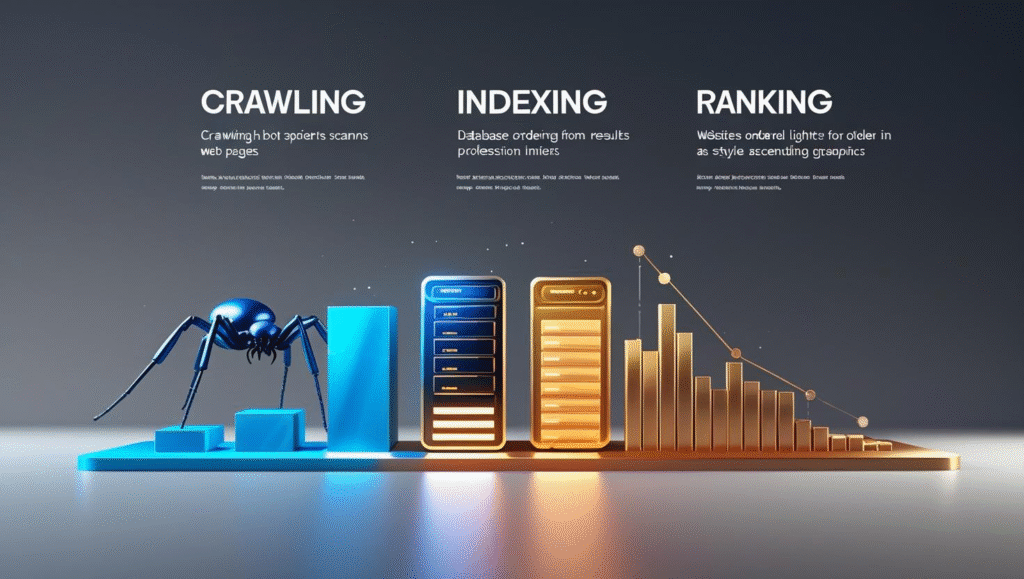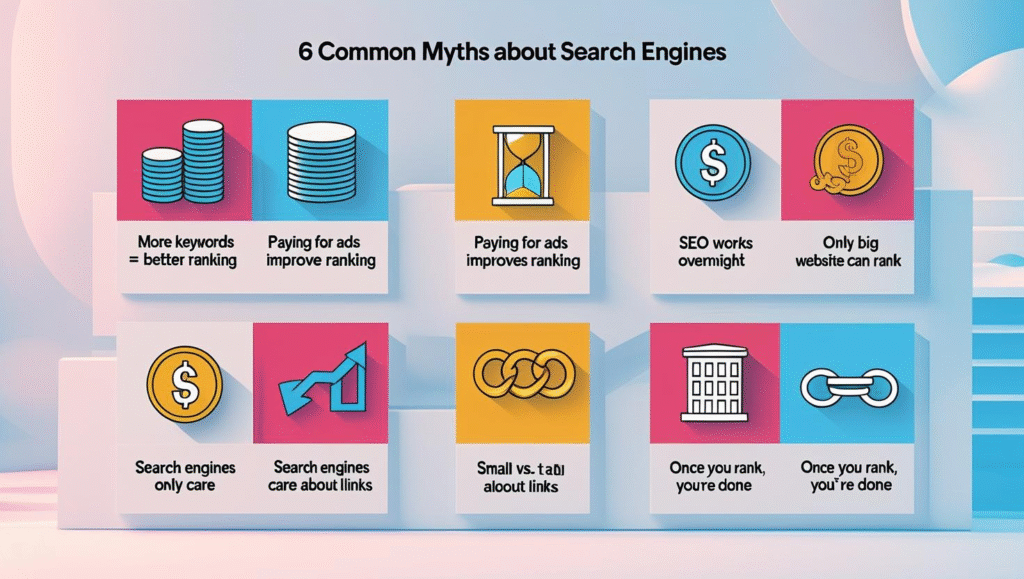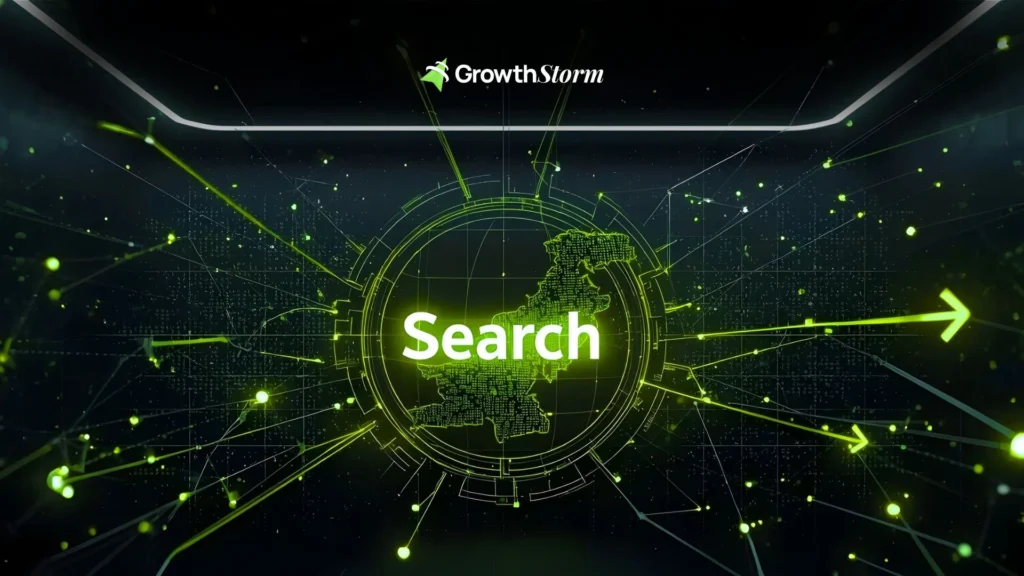Every day, billions of people use search engines to find answers, products, services, or simple information. But for businesses and website owners, one big problem remains: why do some websites show up first while others stay hidden on page ten? The internet is full of content, and without a clear system, finding anything would feel impossible.
This is where search engines come in. If you’ve ever wondered how search engines work, the answer is simple: they use smart systems to crawl, store, and rank billions of web pages. Knowing how this works is the first step to improving your website’s visibility. The more you understand, the better you can optimize your site to reach the right people online.
What Are Search Engines?
A search engine is like a digital librarian for the internet. The internet is full of billions of pages, and without a system, finding anything would take hours. Search engines solve this by scanning the web, organizing information, and showing the most relevant answers within seconds.
When you type “best running shoes,” the search engine doesn’t search the whole internet in real-time. Instead, it looks into its massive database (index) where it has already stored information about millions of pages. It then selects the best results based on what it thinks you want.
The most popular search engine is Google, which dominates the market with over 90% share. Others include Bing, Yahoo, and privacy-focused options like DuckDuckGo. While they all work on the same principles, each one has slightly different algorithms and rules for ranking.
For users, search engines are a quick way to find information. For businesses, they are a powerful tool to be discovered by potential customers. Appearing on the first page of Google is like having your shop on the busiest street in town.
How Search Engines Work (3 Core Steps)
Search engines operate through three essential steps: crawling, indexing, and ranking.
Crawling
Crawling is the discovery stage. Search engines send out bots (called crawlers or spiders) to explore the internet. These bots move from one link to another, scanning new content like blog posts, product pages, or news articles. If your website has broken links or restricted access, the bots may not be able to crawl it properly, which can stop your site from appearing in search results.
Indexing
After crawling, the information is stored in a huge database known as the index. This index contains details about what each page is about, including the text, images, headings, and keywords. If your page is not indexed, it’s invisible to search engines. For example, if you launch a new blog but don’t submit it to Google Search Console, it may take longer to appear because Google hasn’t indexed it yet.
Ranking
When a user types a query, the search engine checks its index and decides which pages should appear and in what order. This process is ranking. Search engines use hundreds of ranking factors, from keywords in your content to the quality of other sites linking to you. Pages that best answer the search query are shown higher.

Key Factors That Affect Rankings
Search engines don’t choose results randomly. They analyze many signals to decide which website deserves the top spot. Here are the most important ones:
Relevance
Search engines want to show results that match the user’s intent. If someone searches for “cheap flights to Dubai,” pages about hotels or rental cars won’t be useful. Instead, the search engine looks for pages that directly answer the request with flights, prices, and booking options.
Backlinks and Authority
Backlinks are links from one website to another. Imagine them as votes of confidence. If many trusted sites link to your content, search engines assume it must be valuable. For example, if a government or university website links to your blog, it carries more weight than a random personal blog.
User Experience
A smooth experience keeps people engaged. Search engines check signals like mobile-friendliness, page loading speed, and easy navigation. If visitors click your site but leave in seconds (high bounce rate), it tells the search engine your page wasn’t helpful.
Content Quality
Quality content means original, informative, and well-structured writing. Search engines look for content that answers questions clearly, uses simple language, and stays up-to-date. Regularly updating old pages with fresh information can help you stay relevant.
Growth Storm Pakistan offers you with all these services

Why Understanding Search Engines Matters
For businesses and website owners, search engines are the bridge to potential customers. When people search for “best lawyer near me” or “organic coffee online,” they are actively looking to take action. If your website appears, you instantly have a chance to win a new customer.
Understanding how search engines work helps you:
- Save money – Instead of relying only on expensive ads, you can use SEO to attract free, long-term traffic.
- Get targeted visitors – Search engines bring people who are already interested in your product or service.
- Build trust – People trust websites that show up on the first page more than those hidden on later pages.
In short, search engines are not just tools for information, they are the gateway to business growth.
Common Myths About Search Engines
Search engines feel like magic, you type a question, and in seconds, you see results. Because of this, many myths and misunderstandings have spread over time. Believing these myths can lead to poor SEO practices and wasted effort. Let’s clear them up one by one.
Myth 1: “More keywords mean better ranking.”
Many beginners think repeating the same keyword over and over will trick search engines into ranking their page higher. This is called keyword stuffing. For example, writing “best pizza in New York” ten times in one paragraph doesn’t help.
The truth: Search engines are smart enough to detect unnatural repetition. They care more about how well your content answers the user’s question. Using keywords naturally, with related terms and synonyms, is far more effective.
Myth 2: “Paying Google helps organic ranking.”
Some people believe that if they spend money on Google Ads, their website will automatically rank higher in unpaid (organic) results.
The truth: Paid ads and organic search are completely separate. Ads can give you visibility for as long as you pay, but they don’t boost your SEO. To improve organic ranking, you need quality content, good backlinks, and strong site performance.
Myth 3: “SEO works overnight.”
It’s easy to believe that a few quick changes can put your site on the first page of Google immediately.
The truth: SEO takes time. It’s like planting a seed, you water it, give it sunlight, and wait for it to grow. Real improvements usually take weeks or months, depending on the competition and your strategy. Shortcuts may give temporary results but often lead to penalties.
Myth 4: “Only big websites can rank.”
Many small businesses think they can’t compete with large brands online.
The truth: While big companies may have more resources, search engines also value relevance and local results. For example, a small bakery can outrank a national brand for “best cupcakes in Karachi” if they focus on local SEO, good reviews, and relevant content.
Myth 5: “Search engines only care about links.”
Backlinks are important, but they are not the only factor. Some believe getting hundreds of links from any site will guarantee top rankings.
The truth: Search engines care about quality links, not just quantity. A single link from a trusted site (like a university or news outlet) is worth more than dozens from spammy websites.
Myth 6: “Once you rank, you’re done.”
Some think SEO is a one-time effort, once you reach the top, you’ll stay there forever.
The truth: SEO is ongoing. Competitors are always trying to outrank you, and search engine algorithms keep changing. If you don’t keep updating and improving, your rankings can drop over time.

Future of Search Engines
The way search engines work is changing rapidly. Here are the key trends shaping the future:
Role of AI and Machine Learning
AI helps search engines understand human language better. Tools like Google’s RankBrain and BERT analyze not just keywords, but the meaning behind searches. This makes results more accurate and user-friendly.
Voice Search and Visual Search
With devices like Alexa, Siri, and Google Assistant, voice search is booming. People now ask questions instead of typing keywords. Similarly, visual search tools let you upload a photo to find products online. Businesses need to adapt by optimizing for voice-friendly queries and image SEO.
Privacy and Personalization
Users are becoming more concerned about privacy. Search engines now balance personalized results with data protection. This means websites must focus on building direct, trustworthy relationships with their audience, like collecting first-party data through sign-ups and newsletters.
More Focus on User Intent
In the future, search engines will rely less on keywords and more on intent. That means they’ll focus on what users actually want, not just what they type. This shift makes high-quality, problem-solving content even more important.
Conclusion
Search engines are the invisible engines that keep the internet organized. They crawl, index, and rank billions of pages so that users can instantly find what they need. For businesses and website owners, understanding how search engines work is no longer optional, it’s the foundation of online success.
When you learn how search engines rank websites, you gain the power to guide your content to the top. By focusing on relevance, quality content, user experience, and trust-building through authority, you can compete with anyone, even bigger brands.
The online world is always changing, and search engines are evolving with AI, voice, and visual search. But one thing remains constant: websites that put the user first will always win.
If you want your website to grow, don’t just publish content and hope for the best. Take the time to optimize, update, and understand how search engines think. Start today, and if you want a professional Digital Marketing Agency to boost your website, so Contact us today and let us serve you.
Search engines follow three main steps: crawling (discovering pages), indexing (storing them in a database), and ranking (showing the most relevant results in order).
Lorem ipsum dolor sit amet, consectetur adipiscing elit. Ut elit tellus, luctus nec ullamcorper mattis, pulvinar dapibus leo.
No. Ads and organic results are separate. Paying for ads only gives temporary visibility, but it does not help organic rankings. SEO and quality content improve long-term ranking.
It helps businesses appear in front of the right audience, save money by using SEO instead of only ads, and build trust by showing up on the first page of results.
Yes. Small websites can rank higher by focusing on local SEO, creating high-quality content, getting good reviews, and offering the most relevant answers to user queries.





